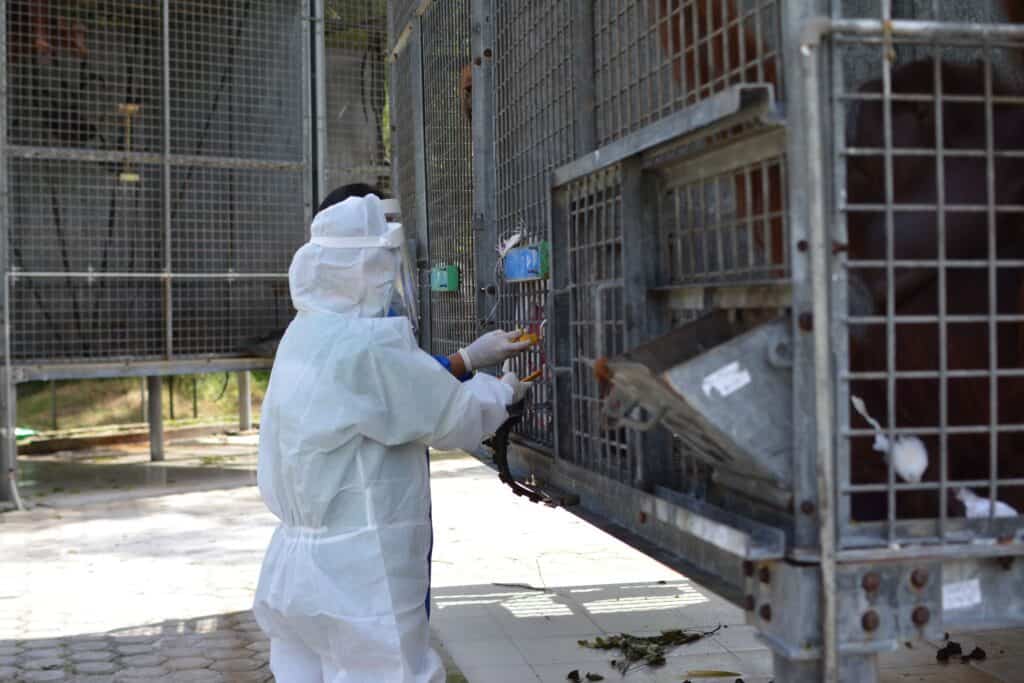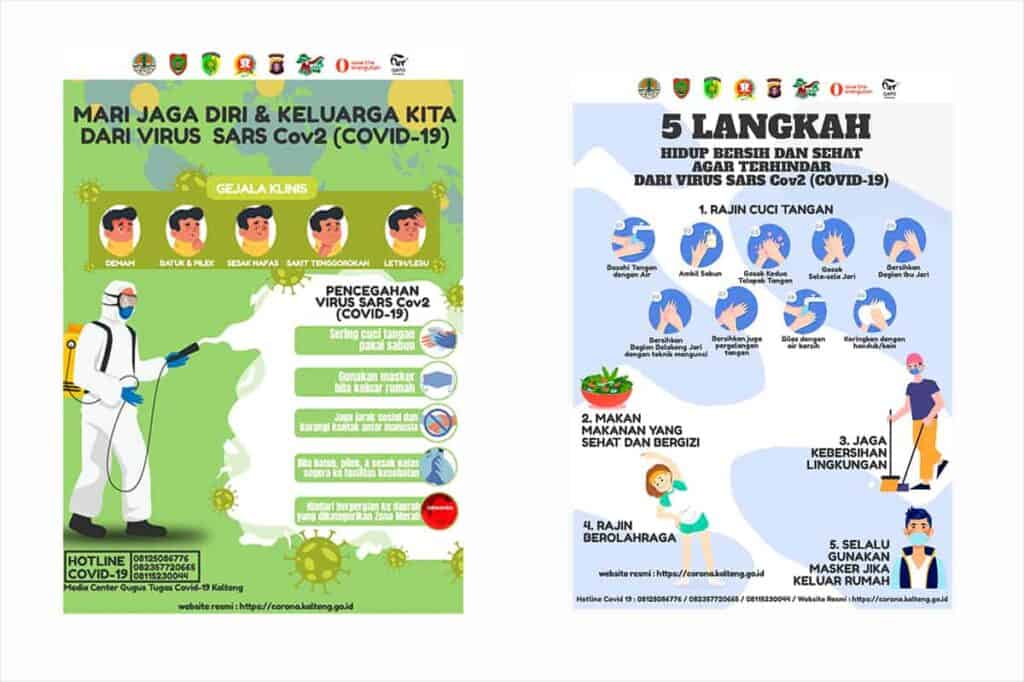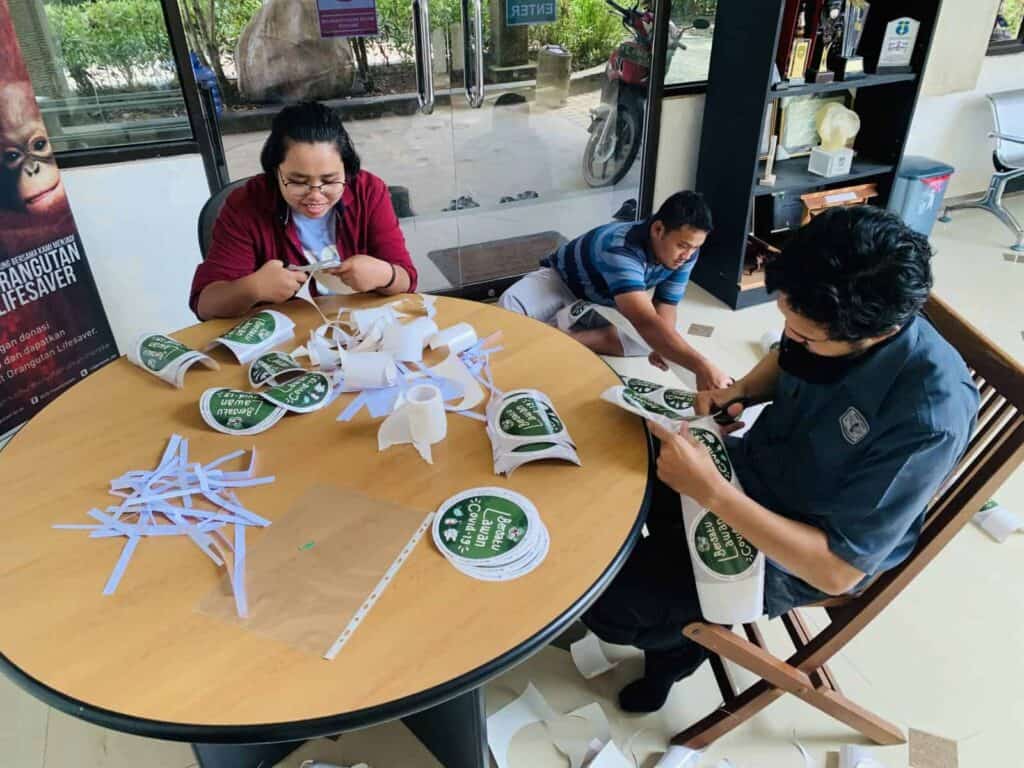Save the Orangutan, together with our Indonesian partner BOS Foundation, has launched two new initiatives to stop the spread of COVID-19. One effort will keep the infection away from the Nyaru Menteng Rehabilitation Centre, another will protect the wild orangutans and indigenous peoples of the rainforest.
In Denmark, society is gradually reopening after lockdown, and although COVID-19 has not been defeated, it is under control. Unfortunately, it looks different in Indonesia.
In Indonesia, COVID-19 has spread to all regions and the number of cases is increasing. It is not only worrying for the population but also for the critically endangered orangutan. Orangutans and humans share many diseases, and several experts have pointed out that COVID-19 most likely poses a significant risk to the orangutans.
You can read more about this here.
“The new coronavirus that causes the disease COVID-19 has unfortunately spread to the areas in Borneo where Save the Orangutan supports various efforts to protect the orangutan – both close to the rehabilitation centres and close to the areas where we work with locals on orangutan conservation projects. That is why it is important to act quickly so that COVID-19 does not spread further, ” explains Hanne Gürtler, Director of Save the Orangutan.
Therefore, together with BOS Foundation, we have begun several efforts to prevent outbreaks of COVID-19. The purpose is to take care of the wild orangutans and the orphaned orangutans in rehabilitation, as well as to help the local communities in our program areas.

Thank you for your support to the rehabilitation centres
As soon as it became clear in March that Indonesia had been hit by the corona crisis, BOS Foundation took immediate safeguarding actions to stop the spread of the virus at the gate of the rehabilitation centres. To take care of staff and orangutans, the rehabilitation centres were quickly closed to all visitors and increased safety procedures were put in place to reduce the risk of COVID-19. The orangutans in forest school continue their rehabilitation for the time being, while the orangutans who are ready for the last step in the rehabilitation process on pre-relase islands will have to wait until COVID-19 is more under control in the area. The orangutans that live on the islands and are ready to be released into the rainforest must also have a bit more patience. The releases have been put on pause to avoid transmission of the virus to the wild living orangutans in the release areas.
To best protect the orangutans from COVID-19, Save the Orangutan launched an emergency campaign in March to provide adequate protection and disinfectants for the centres’ veterinarians and caretakers to protect themselves and the many orangutans. In Denmark and Sweden, more than 120,000 DKK was raised, which has been sent to BOS Foundation for the purchase of the necessary remedies for emergency preparedness at the rehabilitation centres in Borneo. We would like to thank all the contributors for your important donations.
COVID-19 can still affect Nyaru Menteng
It has been shown that the new coronavirus can be transmitted before symptoms appear, and that healthy carriers can also spread the virus. Further actions are therefore needed if we are to ensure that the virus does not enter the rehabilitation centre.
Unfortunately, the villages around the Nyaru Menteng rehabilitation centre are now also affected by COVID-19. The staff caring for the orangutans live in the villages around the centre. If we mitigate COVID-19 in the villages, we can better protect the more than 300 orphaned orangutans at the centre.
Families often live together in a very limited space and have limited or no access to hand sanitizer and masks and even to simple things such as soap and pure water. This reduces the chances of mitigating the spread of the virus. In collaboration with BOS Foundation and with support from i.a. the QATO Foundation, we have, therefore, initiated a new effort aiming to prevent and minimize COVID-19 in 7 villages in close proximity to Nyaru Menteng.

“In order to prevent further spread of this coronavirus, our community development team has adjusted their work programs in the target villages. Our community development team distributes masks, hand soap, disinfectant, and
other sanitation equipment in the local communities,” explains Deni Kurniawan, Manager of Nyaru Menteng Orangutan Rehabilitation Centre.
In addition, the locals and staff at the centre will have a better opportunity to be tested for COVID-19. The effort is carried out in close collaboration with local COVID-19 Health Task Forces set up by the authorities.
The virus can affect the wild orangutans and vulnerable indigenous people
But it is not only the orangutans at the rehabilitation centres who are at risk. So are the wild orangutans living in the rainforest. If COVID-19 hits the wild orangutans, it could be catastrophic for the already critically endangered species. Close to the rainforest also live many indigenous people, who are considered particularly vulnerable in the corona crisis.
“The global pandemic not only affected our two orangutan rehabilitation centres in East Kalimantan and
Central Kalimantan but has also affected the community development activities we carry out in local villages,” says Jhanson Regalino, Manager of Mawas Conservation Program.
Dr. Aldrianto Priadjati, Director of Forest Conservation for RHOI, continues:
“People all around the world are currently working from home to help curb the spread of COVID-19, but despite the conditions we have had to continue our conservation efforts and help the local communities in our working areas.”

COVID-19 efforts in 25 villages
That is why we, together with BOS Foundation and with support from e.g. CISU and the Postcode Foundation have started COVID-19 efforts in 25 villages in the areas where we work together on several conservation programs. The villages are located in Mawas, a protected rainforest area with more than 2,500 wild orangutans, close to the Kehje Sewen rainforest area and the Bukit Baka Bukit Raya National Park (TNBBBR), which both are areas where orangutans from the rehabilitation centres are released, as well as near the Samboja Lestari rehabilitation centre.
The effort focuses on the prevention of COVID-19 and mitigation of the consequences. The villages are informed about how to behave if you become ill. Soap, masks and hand sanitizer are handed out, and washbasins are set up.
“It is thanks to the STO-BOSF partnership project, funded by CISU and the Postcode Foundation, BOSF- RHO can continue our community development projects surrounding the Kehje Sewen Forest during this global pandemic by joining the sub-district COVID-19 task force. Together we have already distributed 312 units of face masks, hand soap, and disinfectant evenly across the three villages.” says Dr. Aldrianto Priadjati.
The activities are carried out in close cooperation with the local authorities and the Indonesian Government’s COVID-19 Health Task Force.
